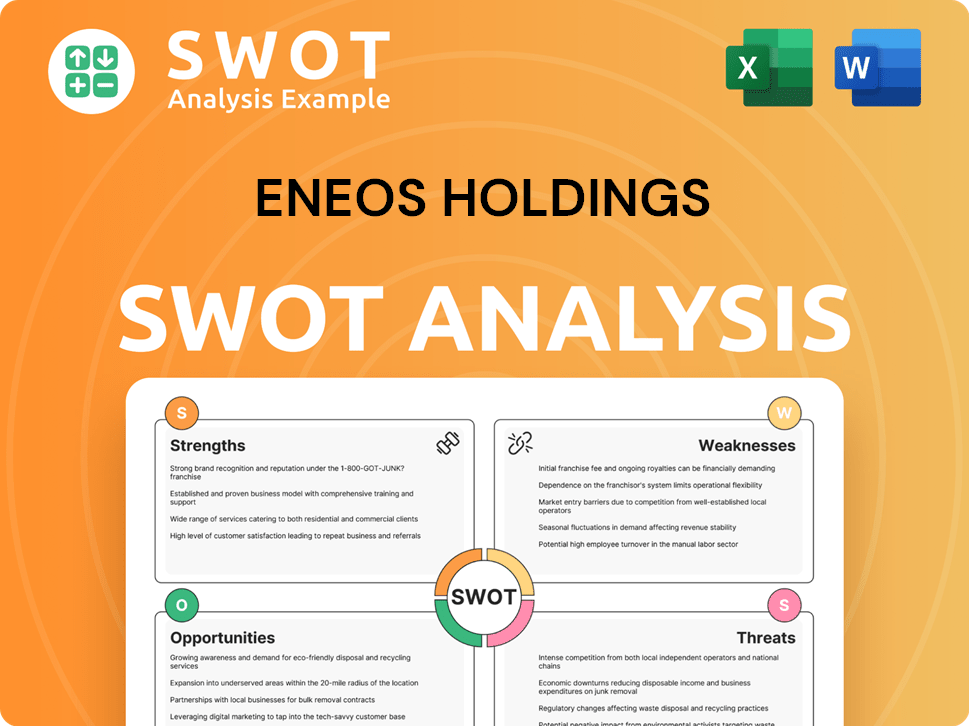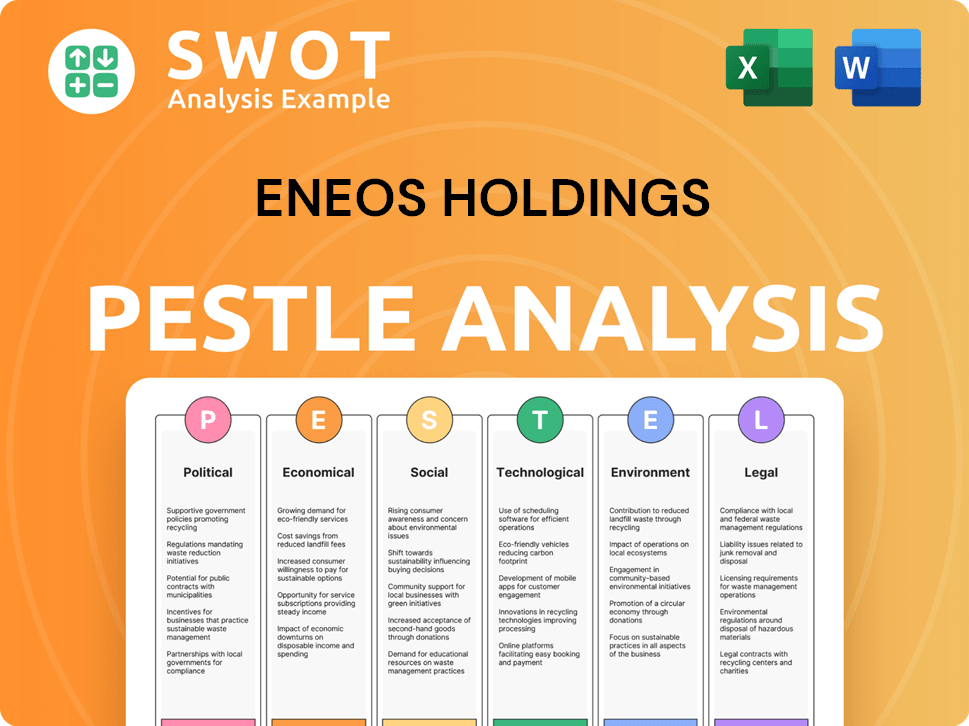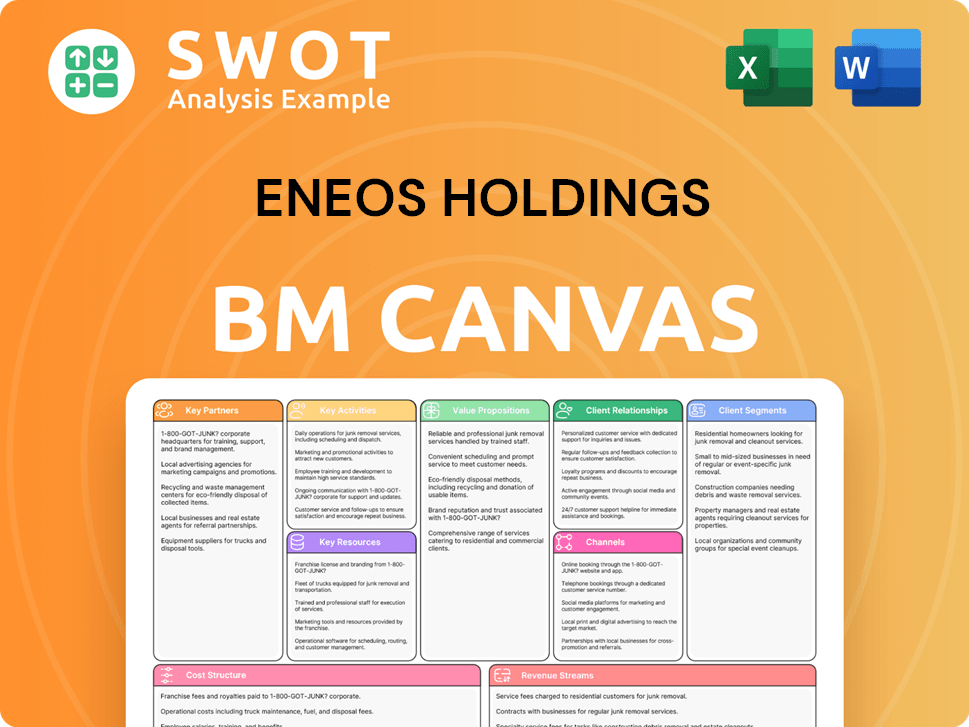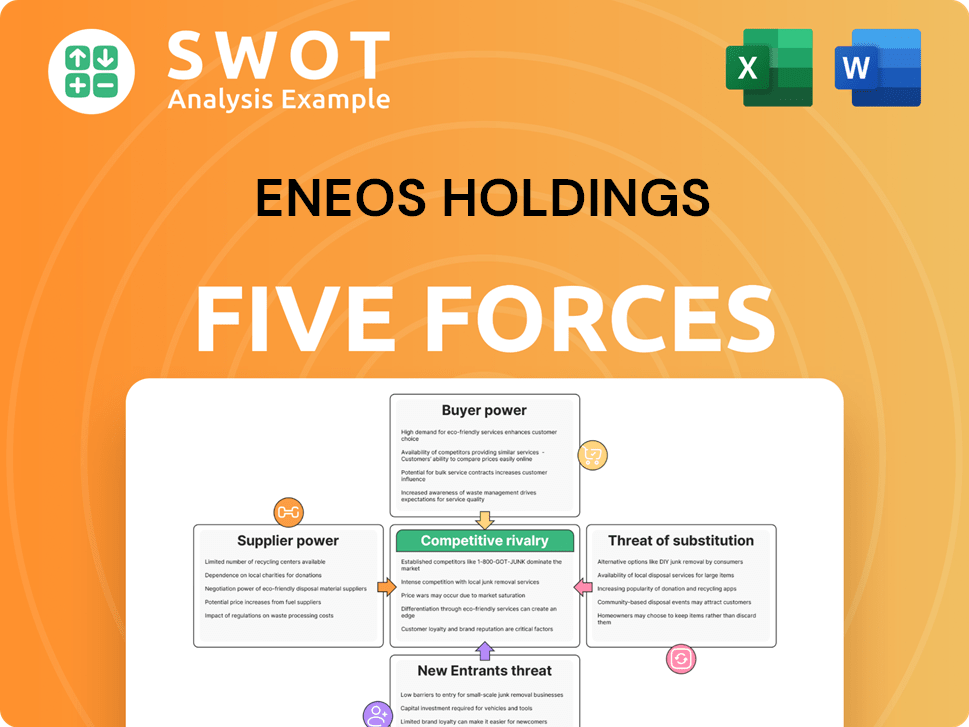ENEOS Holdings Bundle
How Did ENEOS Holdings Become a Global Energy Powerhouse?
From its humble beginnings in 1888 as Nippon Oil, ENEOS Holdings has transformed into a leading global energy and materials conglomerate. This ENEOS Holdings SWOT Analysis reveals the strategic evolution of a Japanese energy company that played a pivotal role in Japan's industrial development. Discover the fascinating ENEOS history and how this company navigated the complexities of the energy sector.

This article delves into the ENEOS company's journey, exploring its origins, strategic expansions, and key innovations. We'll examine the ENEOS Group's growth, including mergers and acquisitions, and its adaptation to the evolving global energy landscape. Learn about the company's financial performance, market share, and future plans, providing a comprehensive overview of this significant player in the industry, formerly known as JXTG Holdings.
What is the ENEOS Holdings Founding Story?
The story of ENEOS Holdings, a prominent Japanese energy company, begins with the establishment of Nippon Oil on May 10, 1888. This marked the start of what would evolve into a major player in Japan's energy sector. The company's early days were characterized by a focus on securing a stable domestic oil supply, crucial for Japan's industrializing economy.
Hisahiro Naito, a Niigata prefectural assembly member, played a pivotal role in the company's founding. Recognizing the potential of the oil business, he collaborated with Yamaguchi Gonzaburo to establish Nippon Oil Corporation Limited. Naito, at the young age of 28, became the first president, guiding the company through its initial stages. The company's initial focus was on the exploration, production, and refining of crude oil, with petroleum as its main product.
The early success of Nippon Oil, including the drilling of an oil well off Amaze, laid a solid foundation for its future growth. The company's formation was driven by the strategic need to meet Japan's growing energy demands during a period of rapid industrialization and modernization. The Owners & Shareholders of ENEOS Holdings have played a crucial role in the company's journey.
The founding of Nippon Oil in 1888 marked the beginning of ENEOS history, driven by the need for a stable domestic oil supply. The company's early business model focused on oil exploration, production, and refining to meet Japan's growing energy needs.
- Established on May 10, 1888, as Nippon Oil (Nihon Sekiyu).
- Founded by Hisahiro Naito, who became the first president at age 28.
- Initial focus on exploration, production, and refining of crude oil.
- The company's origins are rooted in Japan's rapid industrialization and modernization.
ENEOS Holdings SWOT Analysis
- Complete SWOT Breakdown
- Fully Customizable
- Editable in Excel & Word
- Professional Formatting
- Investor-Ready Format

What Drove the Early Growth of ENEOS Holdings?
The early growth and expansion of ENEOS Holdings, tracing back through its predecessors, showcases a strategic journey of mergers and diversification. This Japanese energy company significantly built its presence in the petroleum market. Key moves included major mergers and the formation of strategic partnerships to broaden its scope. This period was critical in establishing its foundation and shaping its future trajectory.
A pivotal moment was the 1999 merger and absorption of Mitsubishi Oil, forming Nippon Mitsubishi Oil, later renamed Nippon Oil Corporation in 2002. In 2010, Nippon Oil Corporation merged with Nippon Mining Holdings, Inc., creating JX Holdings Inc. This integration included diverse energy and metals businesses. These mergers significantly expanded refining and marketing capabilities, solidifying its market position.
Following the 2010 merger, the businesses were reorganized into three core companies: ENEOS Corporation, JX Nippon Oil & Gas Exploration, and JX Nippon Mining & Metals. The establishment of Osaka International Refining Company, Limited, a joint venture with PETROCHINA INTERNATIONAL (JAPAN) CO., LTD., in October 2010, was a key development. Furthermore, the LP gas business was combined to form ENEOS GLOBE Corporation.
By March 2013, JX Holdings was recognized as the 43rd largest company globally by revenue. In 2012, the company employed 24,691 people worldwide. The merger of JX Holdings and TonenGeneral Sekiyu K.K. in April 2017, forming JXTG Holdings, further strengthened its market position. This period of expansion highlights the company's rapid ascent and market reception.
In June 2020, JXTG Holdings was renamed ENEOS Holdings. This transition marked a significant evolution in the company's identity. The strategic moves and restructuring during this period were aimed at expanding product offerings and market reach. For more insights, explore the Growth Strategy of ENEOS Holdings.
ENEOS Holdings PESTLE Analysis
- Covers All 6 PESTLE Categories
- No Research Needed – Save Hours of Work
- Built by Experts, Trusted by Consultants
- Instant Download, Ready to Use
- 100% Editable, Fully Customizable

What are the key Milestones in ENEOS Holdings history?
The ENEOS Holdings has a rich history marked by significant milestones, innovations, and strategic shifts. The company's evolution reflects its adaptability and commitment to the energy sector.
| Year | Milestone |
|---|---|
| 1919 | Nippon Oil, a predecessor company, established Japan's first gas station, revolutionizing fuel distribution. |
| August 2012 | ENEOS Renewable Energy was founded, marking the beginning of the company's expansion into renewable energy. |
| January 2022 | ENEOS Renewable Energy became an ENEOS Group company. |
| April 2024 | ENEOS Renewable Energy changed its name, highlighting a strategic pivot towards sustainable energy. |
| December 2024 | NYK and ENEOS signed an agreement for the sale and purchase of marine fuel with carbon dioxide removal credits. |
| Fiscal Year 2025 | ENEOS Renewable Energy plans to commence construction of an offshore wind power project in Akita Prefecture. |
Technological advancements have been central to ENEOS's strategy, with the company securing a substantial number of patents. These innovations have helped to maintain its competitive edge in the energy market.
The company holds a total of 34,701 patent documents, including applications and grants, demonstrating a strong focus on research and development.
ENEOS has a total of 14,357 patent families, indicating a broad range of technological innovations.
ENEOS has been granted 8,129 patents, reflecting its commitment to technological advancement and innovation in the energy sector.
Despite these achievements, ENEOS has faced challenges, particularly in the context of the global energy transition. The company is adapting its strategies to navigate the evolving energy landscape.
For the fiscal year ending March 31, 2024, ENEOS Holdings reported a decrease in revenue and drops in operating profit and profit before tax compared to the previous year.
In May 2025, ENEOS announced a shift in investment strategy, moving away from earlier ambitions in hydrogen and ammonia to focus more on liquefied natural gas (LNG) and sustainable aviation fuel (SAF).
The company classified its Metals Business as discontinued operations, which impacted its financial figures.
ENEOS aims to increase its refinery utilization rate from 78% in fiscal 2024 to 90% by fiscal 2027.
Despite the challenges, ENEOS aims to increase its dividend payout and forecasts a substantial recovery in operating profit for fiscal year 2025.
ENEOS Holdings Business Model Canvas
- Complete 9-Block Business Model Canvas
- Effortlessly Communicate Your Business Strategy
- Investor-Ready BMC Format
- 100% Editable and Customizable
- Clear and Structured Layout

What is the Timeline of Key Events for ENEOS Holdings?
The story of ENEOS Holdings, a leading Japanese energy company, is a journey of strategic evolution. From its humble beginnings as Nippon Oil to its current status, the ENEOS history reflects the dynamic shifts in the energy sector through mergers, acquisitions, and a forward-thinking approach to sustainability. Understanding the ENEOS Holdings company timeline provides valuable insights into its growth and adaptation.
| Year | Key Event |
|---|---|
| May 10, 1888 | Nippon Oil (Nihon Sekiyu) is established, marking the company's foundational beginning. |
| 1919 | Japan's first gas station is opened by Nippon Oil. |
| 1999 | Nippon Oil merges with Mitsubishi Oil, forming Nippon Mitsubishi Oil. |
| 2002 | Nippon Mitsubishi Oil is renamed Nippon Oil Corporation. |
| April 1, 2010 | Nippon Oil Corporation and Nippon Mining Holdings, Inc. form JX Holdings Inc. |
| July 1, 2010 | JX Holdings reorganizes into three core business companies: ENEOS Corporation, JX Nippon Oil & Gas Exploration, and JX Nippon Mining & Metals. |
| August 2012 | Japan Renewable Energy Corporation (JRE), later ENEOS Renewable Energy, is founded. |
| April 2017 | JX Holdings and TonenGeneral Sekiyu K.K. merge to form JXTG Holdings. |
| June 2020 | JXTG Holdings is renamed ENEOS Holdings, Inc., and JXTG Nippon Oil & Energy Corporation becomes ENEOS Corporation. |
| January 2022 | JRE becomes an ENEOS Group company. |
| April 2024 | ENEOS Renewable Energy Corporation adopts its current name. |
| March 2025 | ENEOS Holdings completes an IPO of JX Advanced Metals as part of its business portfolio transformation. |
| April 1, 2025 | NYK's acquisition of 80% of the shares of a new company formed from ENEOS Ocean's shipping business (excluding crude oil tankers) is expected to be completed. |
| May 12, 2025 | ENEOS Holdings announces its Fourth Medium-Term Management Plan (FY2025-FY2027), outlining a strategic shift towards LNG and sustainable aviation fuel (SAF) while de-emphasizing hydrogen. |
ENEOS Holdings' Fourth Medium-Term Management Plan (FY2025-FY2027) prioritizes investments in low-carbon energy. The company plans to allocate approximately $5 billion, with $2.12 billion towards LNG and $1.71 billion in decarbonized technologies. This strategic pivot reflects a response to the evolving energy landscape, with a focus on practical and sustainable solutions.
ENEOS aims to develop a cumulative total of 2 million kW of solar and onshore wind power plants. Construction for an offshore wind project is planned to commence within FY2025. The company also targets a refinery utilization rate of 90% by fiscal 2027, up from 78% in fiscal 2024, demonstrating a commitment to operational efficiency.
ENEOS Holdings' long-term vision, updated in 2019, centers on playing a key role in a low-carbon, recycling-oriented society by 2040. The company strives to become one of the most competitive energy and materials groups in Asia, building on its foundational commitment to ensuring a stable, sustainable energy supply.
The company's strategic decisions, including the shift away from hydrogen targets, show a pragmatic approach to the energy transition. By focusing on LNG and SAF, ENEOS is positioning itself to meet current market demands while investing in technologies for a sustainable future. To learn more, you can read about the history of ENEOS Holdings.
ENEOS Holdings Porter's Five Forces Analysis
- Covers All 5 Competitive Forces in Detail
- Structured for Consultants, Students, and Founders
- 100% Editable in Microsoft Word & Excel
- Instant Digital Download – Use Immediately
- Compatible with Mac & PC – Fully Unlocked

Related Blogs
- What is Competitive Landscape of ENEOS Holdings Company?
- What is Growth Strategy and Future Prospects of ENEOS Holdings Company?
- How Does ENEOS Holdings Company Work?
- What is Sales and Marketing Strategy of ENEOS Holdings Company?
- What is Brief History of ENEOS Holdings Company?
- Who Owns ENEOS Holdings Company?
- What is Customer Demographics and Target Market of ENEOS Holdings Company?
Disclaimer
All information, articles, and product details provided on this website are for general informational and educational purposes only. We do not claim any ownership over, nor do we intend to infringe upon, any trademarks, copyrights, logos, brand names, or other intellectual property mentioned or depicted on this site. Such intellectual property remains the property of its respective owners, and any references here are made solely for identification or informational purposes, without implying any affiliation, endorsement, or partnership.
We make no representations or warranties, express or implied, regarding the accuracy, completeness, or suitability of any content or products presented. Nothing on this website should be construed as legal, tax, investment, financial, medical, or other professional advice. In addition, no part of this site—including articles or product references—constitutes a solicitation, recommendation, endorsement, advertisement, or offer to buy or sell any securities, franchises, or other financial instruments, particularly in jurisdictions where such activity would be unlawful.
All content is of a general nature and may not address the specific circumstances of any individual or entity. It is not a substitute for professional advice or services. Any actions you take based on the information provided here are strictly at your own risk. You accept full responsibility for any decisions or outcomes arising from your use of this website and agree to release us from any liability in connection with your use of, or reliance upon, the content or products found herein.